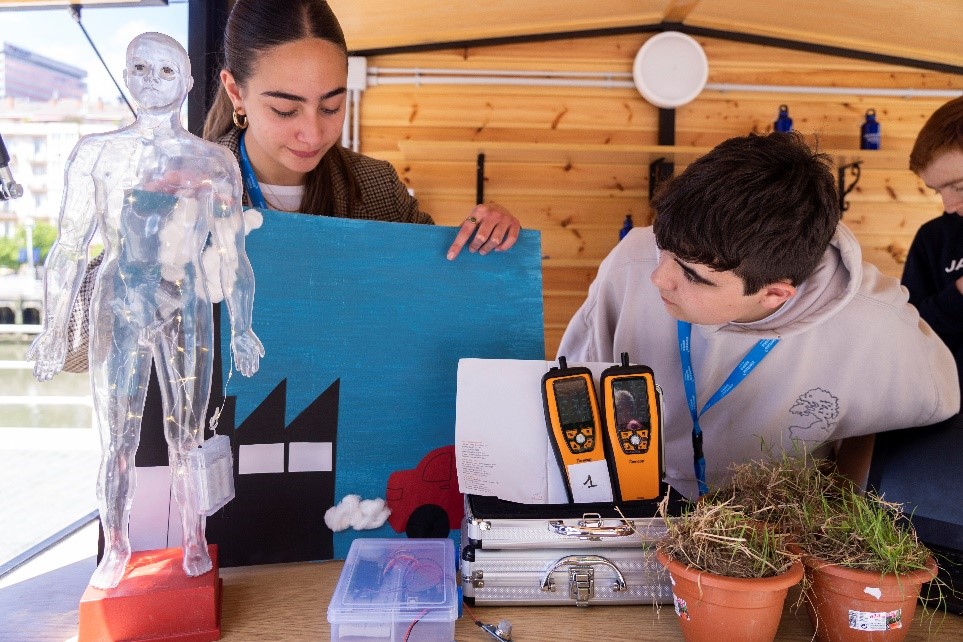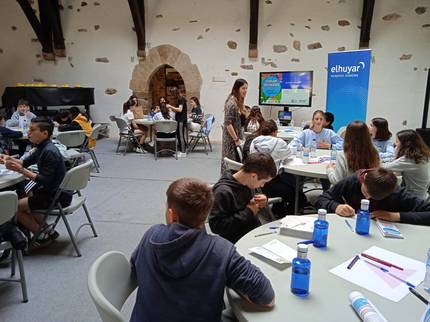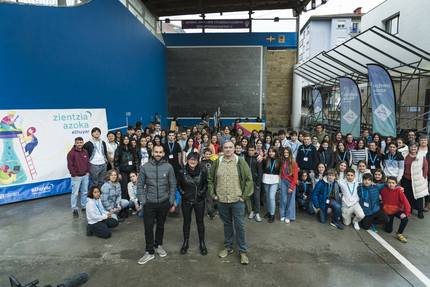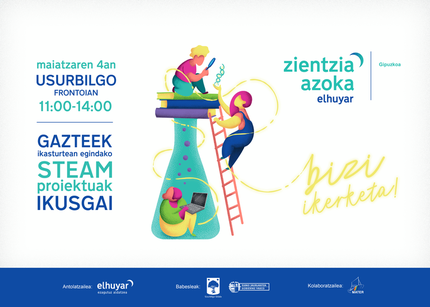536 young Gipuzkoans have carried out research projects related to sustainability and climate emergency with professional researchers
2024/06/12 STEAM-Hezkuntza (Elhuyar Zientzia)
Thanks to the project “The Gluons Table, to inspire young people in the future”, young people from 6 schools in Gipuzkoa have worked with five research groups in the Basque Country and have participated in real research projects. Besides being at the forefront of the world of research, they have had the opportunity to become aware of the importance of sustainability. Elhuyar has carried out this project with the cooperation of the Provincial Council of Gipuzkoa.
 None
None
In total, 6 schools in Gipuzkoa participated in the project: IES La Salle Beasain and IES Txindoki de Beasain, IES Hernani, IES Talaia de Hondarribia, Ikastola Udarrangi de Usurbil and IES Lizardi de Zarautz. Of the 536 participants, 54% were girls and 46% boys, from the ESO to the Baccalaureate.
Research projects
Exploring air quality
- Schools: The Salle Beasain de Beasain and the Ikastola Udarrangi de Usurbil.
- Research team: Sustainable agriculture and biomonitoring of the IDAB (Agrobiotechnology Institute).
Air quality has been measured in the various areas of Beasain and Usurbil using three techniques: on the one hand, air particles have been measured using a measuring device; on the other hand, rain water has been collected and its quality measured; and, on the other hand, the metal levels of the plants have been measured, observing for one month.
Renewable raw materials: wool
- Centre: IES Txindoki de Beasain.
- Research team: Materials+Technology Team of the Gipuzkoa Engineering School of UPV/EHU.
In this project, young people have researched the sustainable use of wool, considered as a residue of the exploitation of the latxa sheep. From the point of view of the circular economy, instead of treating wool as waste, approaches to its transformation and reuse have been analysed. Thus, young people have created a new material that can be useful for construction and have studied its properties.
Observation by Sugandil
- Centre: IES Hernani BHI Hernani
- Research team: Herpetology Area of the Aranzadi Society of Sciences.
In this project the students have studied the sexual behavior of the males of the two morfas of the Lagartija Mural (Podarcis muralis) more abundant in the Basque Country, taking and analyzing the data of the movements performed by the lizards and the use of space. Young people have learned concepts related to the understanding of natural evolution or ecology, such as the value of adaptation to behavior, the evolutionary relationship between the different characteristics, the relationship of species with the environment, the anthropized habitats, the concept of biodiversity… In addition, with this project they have reflected on the conservation of the environment.
Biodiversity and plant blindness
- Centre: IES Talaia BHI de Hondarribia.
- Research team: Physioclimatology of the Faculty of Science and Technology of the UPV/EHU in Leioa.
Through this project, young people have analyzed the impact that the maintenance carried out in the prairies can have on biodiversity. Maintaining urban gardens and grasslands is often detrimental to biodiversity. However, when grassland management is balanced, native plants, insects, birds and other animals find habitable habitats.
Conscious and sustainable nutrition of students
- Centre: IES Lizardi de Zarautz
- Research team: Sustainable Food Group of the Faculty of Pharmacy of Álava of the UPV/EHU.
In recent years, eating habits have changed a lot, especially the younger ones. Through this project, young people have analyzed their eating behaviors. Subsequently, different workshops have learned the effects that eating behaviors can have on people's health and the environment, and, despite the great challenge of betting on healthy and sustainable eating habits, researchers have investigated whether this knowledge they have acquired can be useful in modifying their consumption behaviors.
Reflection on sustainability and the climate emergency
The young people participating in the research projects met in April at the Palace of Igartza in Beasain. It presented projects and made dynamics to reflect on sustainability and climate change. In groups, they imagined the future and made proposals to respond to the current environmental crisis. Proposals made by young people include:
- Enjoy what surrounds us, care for nature, explore the world, welcome all people and share thoughts.
- Even if it sounds silly, small things do a lot if a lot of people do it. These things can be recycled, recovered, reused, reduced… We must never forget that the world is unique and that if we do not take care of ourselves we will lose out.
- Make short showers to spend less water.
- Purchase of products KM 0.
- Collaborating in waste collection.
- Planting trees…
- Use public transport instead of using one's own.
The success of the project “The Gluons Table, to inspire young people in the future” will bring new centres and research groups to the initiative next year. To participate in the event, you must contact the Elhuyar STEAM Education team.
This project, promoted by Elhuyar, is supported by the Department of Economic Promotion and Strategic Projects of the Provincial Council of Gipuzkoa.

Gai honi buruzko eduki gehiago
Elhuyarrek garatutako teknologia






